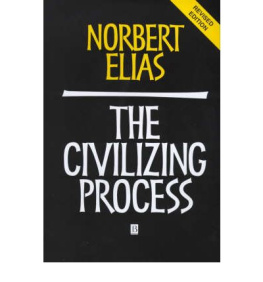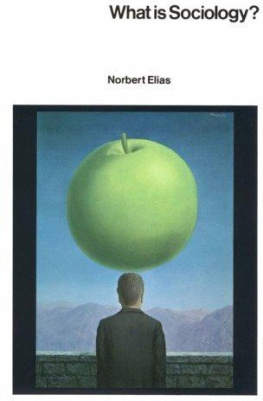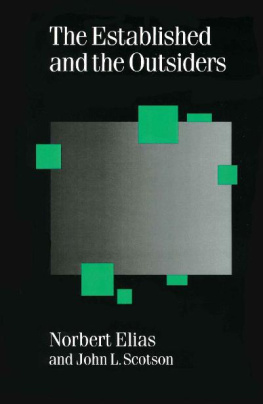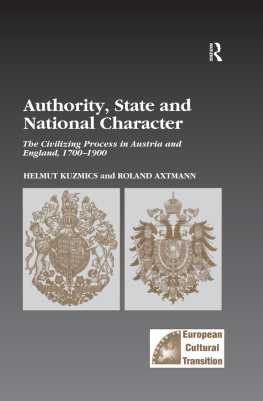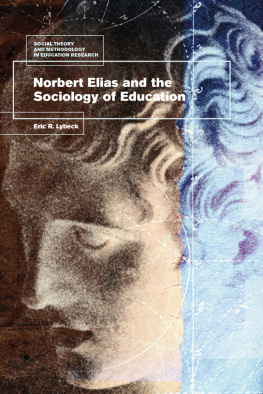Norbert Elias - The Civilizing Process. Sociogenetic and Psychogenetic Investigations
Here you can read online Norbert Elias - The Civilizing Process. Sociogenetic and Psychogenetic Investigations full text of the book (entire story) in english for free. Download pdf and epub, get meaning, cover and reviews about this ebook. year: 2000, publisher: Wiley-Blackwell, genre: Politics. Description of the work, (preface) as well as reviews are available. Best literature library LitArk.com created for fans of good reading and offers a wide selection of genres:
Romance novel
Science fiction
Adventure
Detective
Science
History
Home and family
Prose
Art
Politics
Computer
Non-fiction
Religion
Business
Children
Humor
Choose a favorite category and find really read worthwhile books. Enjoy immersion in the world of imagination, feel the emotions of the characters or learn something new for yourself, make an fascinating discovery.
- Book:The Civilizing Process. Sociogenetic and Psychogenetic Investigations
- Author:
- Publisher:Wiley-Blackwell
- Genre:
- Year:2000
- Rating:4 / 5
- Favourites:Add to favourites
- Your mark:
- 80
- 1
- 2
- 3
- 4
- 5
The Civilizing Process. Sociogenetic and Psychogenetic Investigations: summary, description and annotation
We offer to read an annotation, description, summary or preface (depends on what the author of the book "The Civilizing Process. Sociogenetic and Psychogenetic Investigations" wrote himself). If you haven't found the necessary information about the book — write in the comments, we will try to find it.
The Civilizing Process. Sociogenetic and Psychogenetic Investigations — read online for free the complete book (whole text) full work
Below is the text of the book, divided by pages. System saving the place of the last page read, allows you to conveniently read the book "The Civilizing Process. Sociogenetic and Psychogenetic Investigations" online for free, without having to search again every time where you left off. Put a bookmark, and you can go to the page where you finished reading at any time.
Font size:
Interval:
Bookmark:
This epub is based on the .pdf available on LibGen. A better OCR has been run (via Google Docs) on the pdf and then the ebook was created with the open source epub editor Sigil.
******If you read this epub, please spend a bit of your time to improve this epub.******
What need to be done:
- correct the typos made by the OCR
- remove the header containing the page number and chapter title
- create a table of content
- organize the footnotes
- clean the HTML code (MSWord style like MSoNormal...)
....
December 2015, Epub Version: 1.0

Dedicated to the Memory of My Parents Hermann Elias, d. Breslau 1940 Sophie Elias, d. Auschwitz 1941(?)

Preface
Acknowledgements to the English Translation
Editors' Note to the Revised Translation
VOLUME I: CHANGES IN THE BEHAVIOUR OF THE SECULAR UPPER CLASSES IN THE WEST
PART ONE N THE SOCIOGENESIS OF THE CONCEPTS OF "CIVILIZATION" AND "CULTURE"
1 Sociogenesis of the Antithesis between Kultur and Zivilisation
in German Usage 5 I Introduction 5 II The Development of the Antithesis between Kultur and Zivilisation 9 III Examples of Courtly Attitudes in Germany | 1 IV The Middle Class and the Court Nobility in Germany 15 V Literary Examples of the Relationship of the German
Middle-Class Intelligentsia to the Court 20
VI The Recession of the Social Element and the Advance of the
National Element in the Antithesis between Koltor and Zivilisation 26
vi The Civilizing Process
2 Sociogenesis of the Concept of Civilisation in France
I Introduction
II Sociogenesis of Physiocratism and the French Reform Movement
PART TWC) CIVILIZATION AS A SPECIFIC TRANSFORMATION OF HUMAN BEHAVIOUR
I The History of the Concept of Civilit II On Medieval Manners
III The Problem of the Change in Behaviour during the Renaissance IV On Behaviour at Table
Examples
(a) Representing upper-class behaviour in fairly pure form (b) From books addressed to wider bourgeois strata Comments on the Quotations on Table Manners
Group 1: An Overview of the Societies to which the Texts
were Addressed Excursus on the Rise and Decline of the Concepts
of Courtoisie and Civilit A Review of the Curve Marking the "Civilizing"
of Eating Habits Excursus on the Modelling of Speech at Court Reasons Given by People for Distinguishing
between "Good" and "Bad" Behaviour Group 2: On the Eating of Meat
Use of the Knife at Table On the Use of the Fork at Table v Changes in Attitudes towards the Natural Functions
Examples Some Remarks on the Examples and on these Changes in
General VI On Blowing One's Nose
Examples Comments on the Quotations on Nose-Blowing VII On Spitting Examples Comments on the Quotations on Spitting VIII On Behaviour in the Bedroom
Examples Comments on the Examples
. :
89 92
97 99 I03 107
109 109
Content;
IX Changes in Attitudes towards the Relations between Mem and
Women X On Changes in Aggressiveness XI Scenes from the Life of a Knight
VOLUME II; STATE FORMATION ANI) CIVILIZATION
PART THREE FEUDALIZATION AND STATE FORMATION
Introduction
} Survey of Courtly Society II A Prospective Glance at the Sociogenesis of Absolutism
I Dynamics of Feudalization
I Introduction II Centralizing and Decentralizing Forces in the Medieval
Power Figuration III The Increase in Population after the Great Migration IV Some Observations on the Sociogenesis of the Crusades V The Internal Expansion of Society: The Formation of New
Social Organs and Instruments VI Some New Elements in the Structure of Medieval Society
as Compared with Antiquity VII On the Sociogenesis of Feudalism VIII On the Sociogenesis of Mimneyang and Courtly Forms of
Conduct
On the Sociogenesis of the State
I
II
III
IV
v
VI
The First Stage of the Rising Monarchy: Competition and
Monopolization within a Territorial Framework Excursus on Some Differences in the Paths of Development
of England, France and Germany On the Monopoly Mechanism Early Struggles within the Framework of the Kingdom The Resurgence of Centrifugal Tendencies: The Figuration
of the Competing Princes The Last Stages of the Free Competitive Struggle and Establishment of the Final Monopoly of the Victor
vii
187 187
195 195
viii The Civilizing Process
VII The Power Balance within the Unit of Rule: Its
Significance for the Central Authoritythe Formation of the "Royal Mechanism"
VIII On the Sociogenesis of the Monopoly of Taxation
PART FOUR SYNOPSIS: TOWARDS A THEORY OF CIVILIZING PROCESSES
f The Social Constraint towards Self-Constraint
II Spread of the Pressure for Foresight and Self-Constraint
III Diminishing Contrasts, Increasing Varieties
IV The Courtization of the Warriors
v The Muting of Drives: Psychologization and Rationalization
VI Shame and Repugnance
VII Increasing Constraints on the Upper Class: Increasing Pressure
from Below
VIII Conclusion
POSTSCRIPT (1968)
APPENDICES
I Foreign Language Originals of the Exemplary Extracts and Verses II Plates from Das Mittelalterliche Hausbuch
NOTES
INDEX
365 379 382 387 397 414
Central to this study are modes of behaviour considered typical of people who are civilized in a Western way. The problem they pose is simple enough. Western people have not always behaved in the manner we are accustomed to regard as typical or as the hallmark of "civilized" people. If members of present-day Western civilized society were to find themselves suddenly transported into a past epoch of their own society, such as the medieval-feudal period, they would find there much that they esteem "uncivilized" in other societies today. Their reaction would scarcely differ from that produced in them at present by the behaviour of people in feudal societies outside the Western world. They would, depending on their situation and inclinations, be either attracted by the wilder, more unrestrained and adventurous life of the upper classes in this society, or repulsed by the "barbaric" customs, the squalor and coarseness that he encountered there. And whatever they understand by their own "civilization", they would at any rate feel quite unequivocally that society in this past period of Western history was not "civilized" in the same sense and to the same degree as Western society today.
This state of affairs may seem obvious to many people, and it might appear unnecessary to refer to it here. But it necessarily gives rise to questions which cannot with equal justice be said to be clearly present in the consciousness of living generations, although these questions are not without importance for an understanding of ourselves. How did this change, this "civilizing" of the West, actually happen? Of what did it consist? And what were its "causes" or "motive
X. The Civilizing Process
forces"? It is to the solution of these main questions that this study attempts to contribute,
To facilitate understanding of this book, and thus as an introduction to the questions themselves, it seems necessary to examine the different meanings and evaluations assigned to the concept of "
Next pageFont size:
Interval:
Bookmark:
Similar books «The Civilizing Process. Sociogenetic and Psychogenetic Investigations»
Look at similar books to The Civilizing Process. Sociogenetic and Psychogenetic Investigations. We have selected literature similar in name and meaning in the hope of providing readers with more options to find new, interesting, not yet read works.
Discussion, reviews of the book The Civilizing Process. Sociogenetic and Psychogenetic Investigations and just readers' own opinions. Leave your comments, write what you think about the work, its meaning or the main characters. Specify what exactly you liked and what you didn't like, and why you think so.

